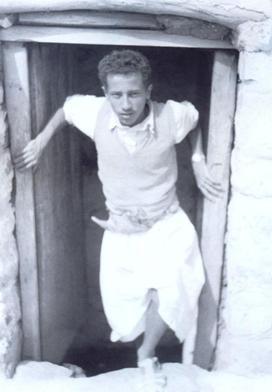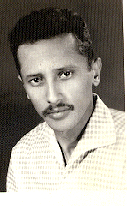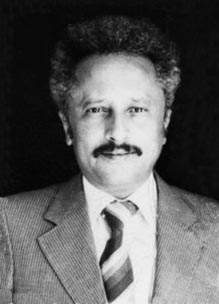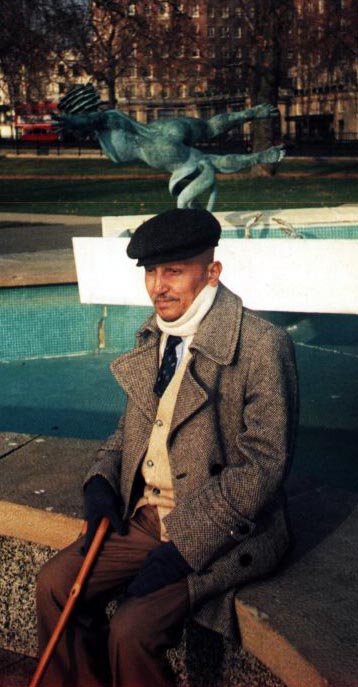|
 Zayd
Mutee Dammaj was born in 1943 in Al-Naqilain area, Al-Saiyani
County, Ibb Province, Yemen.
Zayd
Mutee Dammaj was born in 1943 in Al-Naqilain area, Al-Saiyani
County, Ibb Province, Yemen.

 On May 14, 1944, his
revolutionary father revered sheikh Mutee bin Abdullah Dammaj,
escaped from Al-Shabakah Prison, located in Taiz province, to
Aden. He started to write famous articles in Fatat Al-Jazeerah
(the Girl of the Peninsula) newspaper, a form of civil but
effective resistance against the rule of Imam Yehya in the North
and his dynasty. Later, sheikh Mutee joined hands with his
companions to establish Al-Ahrar Party (The Party of the Free).
On May 14, 1944, his
revolutionary father revered sheikh Mutee bin Abdullah Dammaj,
escaped from Al-Shabakah Prison, located in Taiz province, to
Aden. He started to write famous articles in Fatat Al-Jazeerah
(the Girl of the Peninsula) newspaper, a form of civil but
effective resistance against the rule of Imam Yehya in the North
and his dynasty. Later, sheikh Mutee joined hands with his
companions to establish Al-Ahrar Party (The Party of the Free).
 He received his elementary
education at his villageís Miílamah (traditional school
or madrasa). He exceeded his peers as he studied and memorized
the Holy Quran. His father then took the responsibility for
educating him through his private library, a wide collection of
books he had brought from Aden. Young Zayd was a voracious
reader of books on literature, history and politics, most
important of which were Georgi Zaidanís Riwaiat Al-Islam
(The Novels of Islam).
He received his elementary
education at his villageís Miílamah (traditional school
or madrasa). He exceeded his peers as he studied and memorized
the Holy Quran. His father then took the responsibility for
educating him through his private library, a wide collection of
books he had brought from Aden. Young Zayd was a voracious
reader of books on literature, history and politics, most
important of which were Georgi Zaidanís Riwaiat Al-Islam
(The Novels of Islam).
 His
father had him join Al-Ahmadiyah School in the city of Taiz and
he obtained the primary education certificate in 1957.
His
father had him join Al-Ahmadiyah School in the city of Taiz and
he obtained the primary education certificate in 1957.

 With the help of a close friend, his father could afford to send
him to Egypt in 1958 for the purpose of study. He obtained the
Preparatory School Certificate in the southern town of Bani
Suwaif in 1960 while his Secondary School Certificate was
obtained from Al-Maqasid School in the city of Tanta in 1963.
With the help of a close friend, his father could afford to send
him to Egypt in 1958 for the purpose of study. He obtained the
Preparatory School Certificate in the southern town of Bani
Suwaif in 1960 while his Secondary School Certificate was
obtained from Al-Maqasid School in the city of Tanta in 1963.
 He
joined Cairo Universityís Faculty of Law in 1964 but changed his
mind two years later and studied journalism at the Faculty of
Arts after his literary tendency emerged.
He
joined Cairo Universityís Faculty of Law in 1964 but changed his
mind two years later and studied journalism at the Faculty of
Arts after his literary tendency emerged.
 His
political articles and early stories were published in Al-Yemen
Al-Jadeedah (New Yemen) magazine.
His
political articles and early stories were published in Al-Yemen
Al-Jadeedah (New Yemen) magazine.
 In
1968, his father summoned him back home. He left Egypt for Yemen
to participate in the revolutionary activities and stay beside
his father who refused to give up any of the Revolutionís Goals
and reconcile with the Royalists who supported the ousted
Imamate regime. He could not complete his study due to his
fatherís health conditions and his dedication to political
activism.
In
1968, his father summoned him back home. He left Egypt for Yemen
to participate in the revolutionary activities and stay beside
his father who refused to give up any of the Revolutionís Goals
and reconcile with the Royalists who supported the ousted
Imamate regime. He could not complete his study due to his
fatherís health conditions and his dedication to political
activism.
 In
1970, he was elected into Al-Shoura Council (The Consultative
Council), which was the first elected parliament in the country,
representing Al-Saiyani County. He served as Chairman of the
Suggestions, Petitions, and Grievance Investigation Committee.
In
1970, he was elected into Al-Shoura Council (The Consultative
Council), which was the first elected parliament in the country,
representing Al-Saiyani County. He served as Chairman of the
Suggestions, Petitions, and Grievance Investigation Committee.
 On Jan
14, 1972, his father passed away, an event that proved to have a
great effect on his personal, literary and political life.
On Jan
14, 1972, his father passed away, an event that proved to have a
great effect on his personal, literary and political life.

 In
January 1976, he was appointed governor of Mahweet province and
was consecutively elected twice as a member of Al-Shaíb Council
(The Peopleís Council).
In
January 1976, he was appointed governor of Mahweet province and
was consecutively elected twice as a member of Al-Shaíb Council
(The Peopleís Council).
 He
was appointed Delegated Minister and Acting Ambassador to Kuwait
in 1980.
He
was appointed Delegated Minister and Acting Ambassador to Kuwait
in 1980.
 In 1982, he was elected
member in the Permanent Committee of the ruling party General
Peopleís Congress and a rapporteur of the GPCís Political
Committee.
In 1982, he was elected
member in the Permanent Committee of the ruling party General
Peopleís Congress and a rapporteur of the GPCís Political
Committee.
 Member
of the Union of Yemeni Writers; Member of the Union of Arab
Writers; Member of the Afro-Asian Writers; Secretary General of
Yemen Peace and Solidarity Council; Member of the World Peace
Council.
Member
of the Union of Yemeni Writers; Member of the Union of Arab
Writers; Member of the Afro-Asian Writers; Secretary General of
Yemen Peace and Solidarity Council; Member of the World Peace
Council.
 He was appointed Advisor to
the Minister of Foreign Affairs and a delegated minister in
Britain in 1997.
He was appointed Advisor to
the Minister of Foreign Affairs and a delegated minister in
Britain in 1997.
Publications:
1-
Tahish Al-Hawban
(Al-Hawban Monster), a story collection published in 1973
(Second Print 1979; Third Print in 1980).

2-
Al-ĎAqrab (The
Scorpion), a story collection published in 1982.
3-
Al-Rahinah (The
Hostage), a novel first published in 1984 by Al-Adab House,
Beirut.
(Second Print
in 1988 by the Cultural Affairs House, Baghdad.)
(Third Print
in 1997 by Riyadh Al-Rayis House, Beirut.)
(Fourth Print
in 1999, Reading for All Festival, Cairo.)
-
translated into French and published in 1991 by EDIFRA.
-
Translated into English and published in 1994 by Interlink.
-
Translated into German in 1999 and is currently being translated
into Russian, Japanese and Spanish.
-
Featured in the UNESCO sponsored project Kitab fi Jaridah (A
Book in a Newspaper) in 1998.
-
In
early 2000, Al-Raheenah was selected by the Egyptian Writers
Union among the best one hundred Arabic novels in the 20th
century.
4-
Al-Jesr (The
Bridge), a story collection published in 1986.
5-
Ahzan Al-bint Mayasah
(The Grieves of Girl Mayassah), published in 1990.
6-
Al-Inbihar wa Al-Dahshah
(The Amazement and the astonishment), a narrative from the
authorís memory published in 2000.
7-
Al-Madfaí Al-Asfar
(The Yellow Cannon), a story collection published in 2001.
8-
Al-Madrasah Al-Ahmadiyah
(The Ahmadi School), a novel being printed.

 Zaid Mutee Dammaj contributed a large amount of political and
social articles published in a number of local and Arab
newspapers and magazines. His literary works provide valuable
material for instruction at schools and universities.
Zaid Mutee Dammaj contributed a large amount of political and
social articles published in a number of local and Arab
newspapers and magazines. His literary works provide valuable
material for instruction at schools and universities.
 On March 20, 2000, he passed away at The Middlesex University
Hospital, London, at the age of 57. His lifetime was devoted to
the defense of human and national causes. He left behind a wide
range of works that enriched the Yemeni and Arab literary arena
and catapulted him deservingly into the ranks of international
writers.
On March 20, 2000, he passed away at The Middlesex University
Hospital, London, at the age of 57. His lifetime was devoted to
the defense of human and national causes. He left behind a wide
range of works that enriched the Yemeni and Arab literary arena
and catapulted him deservingly into the ranks of international
writers.

|
